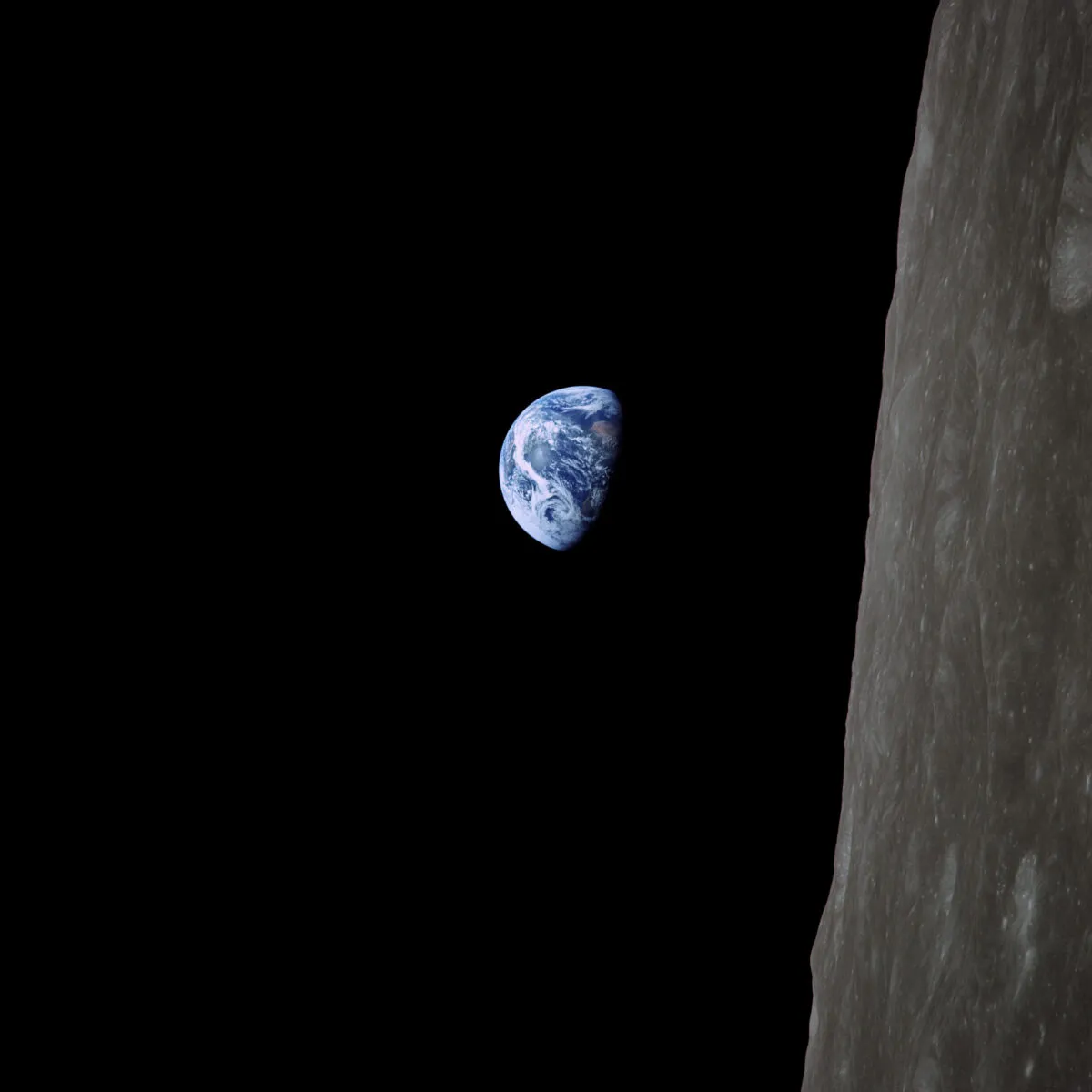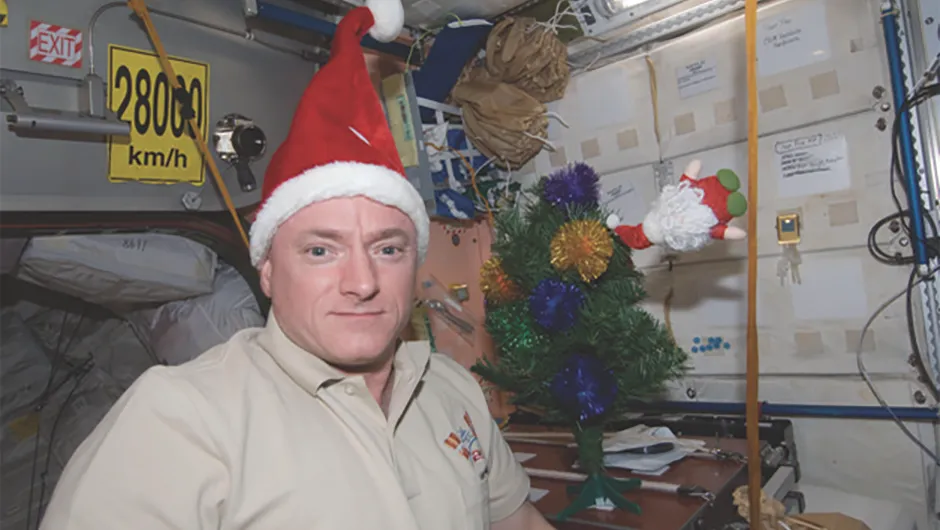On 21 December, 1968, NASA’s Apollo 8 mission launched from Kennedy Space Center in Florida.
68 hours later, the spacecraft reached the Moon, orbiting the satellite 10 times in a 20-hour period before returning to Earth.
During those 20 hours, astronauts Frank Borman, James Lovell and William Anders became the first humans ever to spend Christmas in space – but they were by no means the last.

In fact, since the first crew arrived at the International Space Station (ISS) in 2000, Christmas has been celebrated in space every year, as have Hanukah and New Year.
Humans have been in space long enough for certain Christmas traditions to have developed.
This a history of Christmas in space and the kind of festivities ISS astronauts might be looking forward to this year.

Early years of Christmas in space
We can look all the way back to December 1965, when Jingle Bells became the first song played in space.
It was broadcast on 16 December 1965 by astronauts Wally Schirra and Thomas P. Stafford during NASA's Gemini 6A mission.
But while the first astronauts to 'celebrate' an off-Earth Yuletide were arguably the crew of Gemini 6A, they weren't the first to spend Christmas Day itself in space.
That title goes to the Apollo 8 crew, who marked Christmas by beaming back images of the Moon to Earth, the three astronauts reciting verses from the Book of Genesis over the top.

A fairly simple event as media spectaculars go, but that didn’t stop a billion people tuning in from 64 countries.
At the time, that was a third of the world’s population, and the broadcast retained its title as the most watched in history for quite a few years afterwards.
What’s more, you can watch that very same broadcast for yourself, below!
Christmas on Skylab
The first astronauts to properly celebrate Christmas in space, though, were Gerald Carr, William Pogue and Edward Gibson, who spent the Thanksgiving – New Year period onboard the much more spacious Skylab space station in 1973.
The Skylab 4 crew built themselves an improvised Christmas tree out of empty food containers, dined on a pre-prepared Christmas dinner and opened presents from their families.
Carr, Pogue and Gibson also got to talk to their families via satellite link, establishing a tradition that continues to this day.

A few years later, Yuri Romanenko and Georgi Grechko became the first Russian cosmonauts to celebrate the New Year (a much bigger event in Russia than Christmas) in space.
And in 1993 NASA astronaut Jeffrey Hoffman, onboard the Space Shuttle as part of Hubble repair mission STS-61, became the first Jewish astronaut to celebrate Hanukah in space.

Christmas on the Space Station
Both the Space Shuttle and Russia’s Mir space station would see further festivities on several occasions in the '80s and '90s.
But things really stepped up a notch with NASA’s William Shepherd and Roscosmos’s Yuri Gizenko and Sergei Krikalev, who became the first astronauts to arrive at the Space Station in 2000.
The Expedition 1 crew arrived on 2 November 2000 and returned to Earth in March 2001, making them the first astronauts to spend Christmas on the Space Station.

They opened presents that had been delivered by a Russian supply ship and NASA's Space Shuttle Endeavour, ate rehydrated turkey and called their families to wish them a happy Christmas.
There has been at least one human being in space constantly ever since that day.

When do astronauts celebrate Christmas?
Christmas onboard the Space Station is a little different from Christmas on Earth
For starters, knowing exactly when to celebrate can be tricky if you’re seeing 16 sunrises a day!
A tradition has developed that astronauts send a ‘happy New Year’ message to each ground-based Mission Control centre they pass over, timed to coincide with the arrival of midnight in each country.
What’s more, not everyone celebrates Christmas in space at the same time.

Any Russian cosmonauts who are Orthodox Christians will celebrate on 7 January rather than 25 December (according to the Julian, not the Gregorian calendar, in other words).
And in any case, New Year’s Eve is the bigger celebration for most Russians, while Jewish astronauts will mark Hanukah instead.
But the ISS is all about international cooperation, so anyone onboard may find themselves celebrating several times over the course of a single festive season.
Andrew Morgan, who spent Christmas 2019 on the International Space Station, recalls one good example of that.

Russians have a modern New Year’s Eve tradition that involves watching a 1976 comedy film called ‘The Irony of Fate’ (much as Germans like to watch ‘Dinner For One’ at Christmas, or Brits might watch re-runs of ‘Only Fools & Horses’ Christmas specials).
So Morgan and his US crew mates joined their Russian colleagues in their segment for a screening.
"To experience that with our Russian crew mates was extra special," Morgan told CNN in 2020.
"That exchange of those traditions and experiencing each others’ holidays and sharing that with each other across an international crew, that will be the thing I take away from that experience.
"It embodies everything good about international cooperation."

Astronaut Christmas traditions
Christmas Day onboard the ISS can be quite similar to Christmas Day here on Earth.
There’s no rule to say they have to (or can’t), but many crews over the years have stashed away little presents to give each to each other on Christmas morning.
Morgan gave the whole crew harmonicas, so they could form a harmonica band.
In 2010, astronauts’ relatives back on Earth even took advantage of the serendipitous timing of a supply mission to arrange a little surprise for their orbiting loved ones.
With the cargo-carrying craft due to arrive just before Christmas, they persuaded its crew to take some presents along – with the result that ISS astronauts woke to find Christmas stockings from their families hanging on the doors of their sleeping compartments!

Beyond that, Christmas in space sounds like a pretty chilled affair.
It’s a holiday for all concerned, regardless of faith or ethnicity, so unless there’s any critical maintenance to be carried out – a couple of Christmas Eve spacewalks have been required over the years – then the crew will spend the day eating a special meal together, listening to Christmas music, watching films and talking to families back on Earth via satellite hook-up, continuing the tradition that began on Skylab 50 years ago.
About the only thing astronauts CAN’T do at Christmas, in fact, is drink alcohol.

That’s because the ISS is only made possible in the first place by advanced water-processing systems that recycle the crew’s urine, breath and sweat – and those systems would break down were any alcohol to be introduced.
So beer, mulled wine and eggnog are out, but Santa hats are a familiar sight and yes, there is a little two-foot Christmas tree onboard, complete with the baubles to go on it.
Though as ESA astronaut Paulo Nespoli told BBC Future in 2013: “It’s the same as at home, when you know you’ve put them somewhere and you can never find them!”

All told, then, Christmas in space really isn’t THAT different from Christmas on Earth – except that, while most of us like to spend Christmas with our families, those onboard the ISS spend it a long, long way from theirs.
But as Nespoli says, that’s kind of an honour in itself.
"You’re sad that you can’t be with family and friends," he told BBC Future, "but at the same time you recognise the uniqueness of the situation.
"Being able to call people from space and wish them Merry Christmas is very special."
